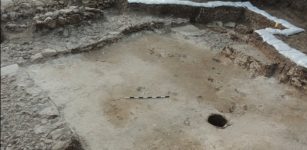Evidence Of An Unknown Neolithic Society At Oued Beht In North Africa Discovered
Conny Waters - AncientPages.com - Recent fieldwork in Morocco has uncovered evidence of the earliest known farming society from a previously poorly understood period of northwest African prehistory. This discovery sheds light on the region's ancient history and early agricultural practices.
Aerial photograph of the Oued Beht ridge and river, highlighted in colour. Credit: Toby Wilkinson
Ancient Egypt emerged around 3150 B.C., but an impressive civilization flourished 250 years earlier in Morocco. An international team of archaeologists has recently revealed that their excavations at the Oued Beht River indicate the area was as large as Troy during the Early Bronze Age. Initial discoveries of stone axes and stone walls were made in the 1930s, yet it took nearly a century before a comprehensive archaeological survey was conducted.
The previously unknown farming society, which existed between 3400 and 2900 B.C., represents the earliest and largest agricultural complex discovered in Africa outside of the Nile region. This site exhibits characteristics akin to contemporaneous locations in Iberia.
Recent archaeological findings indicate that the Maghreb was crucial in shaping the western Mediterranean during the fourth and third millennia B.C. Its Mediterranean climate, proximity to the Sahara Desert, and position as the shortest maritime crossing between Africa and Europe underscore its strategic importance as a center for significant cultural developments and intercontinental interactions.
While the significance of this region during the Palaeolithic, Iron Age, and Islamic periods is well-documented, there remains a considerable gap in our understanding of Maghreb archaeology from approximately 4000 to 1000 B.C., a period marked by dynamic changes throughout much of the Mediterranean.
To tackle this, Youssef Bokbot (INSAP), Cyprian Broodbank (Cambridge University), and Giulio Lucarini (CNR-ISPC and ISMEO) have carried out collaborative, multidisciplinary archaeological fieldwork at Oued Beht, Morocco.
"For over thirty years I have been convinced that Mediterranean archaeology has been missing something fundamental in later prehistoric north Africa. Now, at last, we know that was right, and we can begin to think in new ways that acknowledge the dynamic contribution of Africans to the emergence and interactions of early Mediterranean societies," Professor Broodbank said in a press release.
The team has uncovered unprecedented domesticated plant and animal remains, pottery, and lithics, all dating to the Final Neolithic period. Furthermore, the excavation revealed extensive evidence of deep storage pits. Notably, similar contemporaneous sites with such pits have been identified across the Strait of Gibraltar in Iberia, where discoveries of ivory and ostrich eggs have long indicated African connections. This evidence suggests that the Maghreb played a crucial role in broader western Mediterranean developments during the fourth millennium BC.
Final Neolithic pottery from Oued Beht: a) buff fabric bowls, jar (with post-firing hole), large tunnel lugs and round base; b) red-brown fabric cooking vessels; c) painted sherds (scale bar = 50mm) (photographs by Rafael Laoutari, Rafael Martínez Sánchez & Moad Radi).
Oued Beht and the north-west Maghreb were evidently integral parts of the wider Mediterranean region. Consequently, these findings significantly alter our understanding of later prehistory in both the Mediterranean and Africa.
"It is crucial to consider Oued Beht within a wider co-evolving and connective framework embracing peoples both sides of the Mediterranean-Atlantic gateway during the later fourth and third millennia BC—and, for all the likelihood of movement in both directions, to recognise it as a distinctively African-based community that contributed substantially to the shaping of that social world," the researchers write in their study.
The study was published in the journal Antiquity.
Written by Conny Waters - AncientPages.com Staff Writer






















